| Listing 1 - 8 of 8 |
Sort by
|
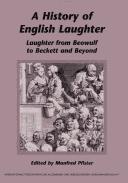
Abstract | Keywords | Export | Availability | Bookmark
 Loading...
Loading...Choose an application
- Reference Manager
- EndNote
- RefWorks (Direct export to RefWorks)
English literature --- Thematology --- Esprit et humour --- Geestigheid and humor --- Lach in de kunst --- Lach in de literatuur --- Laughter in art --- Laughter in literature --- Rire dans l'art --- Rire dans la littérature --- Wit and humor --- Geestigheid en humor --- Laughter --- England --- History
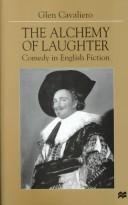
ISBN: 033377048X 0312225512 Year: 2000 Publisher: New York London St. Martin's Press Macmillan
Abstract | Keywords | Export | Availability | Bookmark
 Loading...
Loading...Choose an application
- Reference Manager
- EndNote
- RefWorks (Direct export to RefWorks)
Fiction --- Thematology --- English literature --- anno 1800-1999 --- Comic [The ] in literature --- Comique [Le ] dans la littérature --- Komische [Het ] in de literatuur --- Lach in de literatuur --- Laughter in literature --- Rire dans la littérature --- English fiction --- History and criticism --- Humorous stories [English ]
Book
ISBN: 9512903350 9512905515 9512910063 Year: 1997 Volume: 208 Publisher: Turku : Turun Yliopisto,
Abstract | Keywords | Export | Availability | Bookmark
 Loading...
Loading...Choose an application
- Reference Manager
- EndNote
- RefWorks (Direct export to RefWorks)
Humor en geestigheid in de literatuur --- Humor in literature --- Humour dans la littérature --- Lach in de literatuur --- Laughter in literature --- Rire dans la littérature --- Literature --- -humor in literature --- Belles-lettres --- Western literature (Western countries) --- World literature --- Philology --- Authors --- Authorship --- History and criticism --- Humor in literature. --- Laughter in literature. --- History and criticism. --- Rire --- Essais --- Esprit et humour --- Comique, le --- Ironie --- Histoire
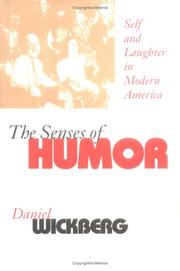
ISBN: 080143078X 0801456665 0801454387 0801454379 9780801454387 9780801456664 9780801456664 9780801430787 Year: 2015 Publisher: Ithaca
Abstract | Keywords | Export | Availability | Bookmark
 Loading...
Loading...Choose an application
- Reference Manager
- EndNote
- RefWorks (Direct export to RefWorks)
Why do modern Americans believe in something called a sense of humor and how did they come to that belief? Daniel Wickberg traces the cultural history of the concept from its British origins as a way to explore new conceptions of the self and social order in modern America. More than simply the history of an idea, Wickberg's study provides new insights into a peculiarly modern cultural sensibility.The expression "sense of humor" was first coined in the 1840s and the idea that such a sense was a personality trait to be valued developed only in the 1870s. What is the relationship between Medieval humoral medicine and this distinctively modern idea of the sense of humor? What has it meant in the past 125 years to declare that someone lacks a sense of humor? How is the joke, as a twentieth-century quasi-literary form, different from the traditional folktale? Wickberg addresses these questions, among others, using the history of ideas to throw new light on the way contemporary Americans think and speak.The context of Wickberg's analysis is Anglo-American; the specifically British meanings of humor and laughter from the sixteenth century forward provide the framework for understanding American cultural values in the nineteenth and twentieth centuries. The genealogy of the sense of humor is, like the study of keywords, an avenue into a significant aspect of the cultural history of modernity. Drawing on a wide range of sources and disciplinary perspectives, Wickberg's analysis challenges many of the prevailing views of modern American culture and suggests a new model for cultural historians.
Lach in de literatuur --- Laughter in literature --- Rire dans la littérature --- Self in literature --- Soi dans la littérature --- Zelf in de literatuur --- Self in literature. --- Laughter --- American wit and humor --- Laughing --- Emotions --- Nonverbal communication --- Wit and humor --- Social aspects --- History and criticism. --- United States --- Social life and customs --- History and criticism --- 20th century
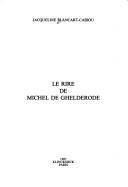
ISBN: 2252025646 9782252025642 Year: 1987 Volume: 3 Publisher: Paris : Klincksieck,
Abstract | Keywords | Export | Availability | Bookmark
 Loading...
Loading...Choose an application
- Reference Manager
- EndNote
- RefWorks (Direct export to RefWorks)
Ghelderode, de, Michel --- De Ghelderode, Michel --- Franse letterkunde --- Lach in de literatuur --- Laughter in literature --- Littérature française --- Rire dans la littérature --- Ghelderode, Michel de, --- Criticism and interpretation --- Critique et interprétation --- Ghelderode, Michel de --- -Criticism and interpretation --- Rire dans la littérature --- Critique et interprétation --- De Ghelderode, Michel, --- Gelʹderod, Mishelʹ de, --- גלדרוד, מישל דה, --- Martens, Adémar-Adolphe-Louis, --- Criticism and interpretation. --- de Ghelderode, Michel --- Gelʹderod, Mishelʹ de --- Martens, Adémar-Adolphe-Louis --- Ghelderode, Michel de, - 1898-1962 - Criticism and interpretation --- Ghelderode (ademar martens, dit michel de), auteur dramatique belge, 1898-1962 --- Littérature belge de langue française --- Critique et interpretation --- 20e siècle --- Ghelderode, Michel de, - 1898-1962
Book
ISBN: 2251326391 9782251326399 Year: 1990 Volume: 119 Publisher: Paris Les belles Lettres
Abstract | Keywords | Export | Availability | Bookmark
 Loading...
Loading...Choose an application
- Reference Manager
- EndNote
- RefWorks (Direct export to RefWorks)
Emoties in de literatuur --- Emotions dans la littérature --- Emotions in literature --- Lach in de literatuur --- Larmes dans la littérature --- Laughter in literature --- Rire dans la littérature --- Tears in literature --- Tranen in de literatuur --- Crying in literature --- Greek literature --- Pleurs dans la littérature --- Littérature grecque --- History and criticism --- Histoire et critique --- Psychological aspects --- -Balkan literature --- Byzantine literature --- Classical literature --- Classical philology --- Greek philology --- Crying in literature. --- Emotions in literature. --- Laughter in literature. --- Tears in literature. --- Psychological aspects. --- -Psychological aspects --- Pleurs dans la littérature --- Emotions dans la littérature --- Littérature grecque --- Rire dans la littérature --- Balkan literature --- Greek literature - Psychological aspects
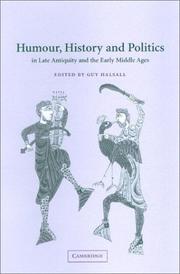
ISBN: 0521811163 9780521811163 Year: 2002 Publisher: Cambridge Cambridge University press
Abstract | Keywords | Export | Availability | Bookmark
 Loading...
Loading...Choose an application
- Reference Manager
- EndNote
- RefWorks (Direct export to RefWorks)
Essays on the use of humour by late antique and early medieval writers.
Civilization, Medieval --- Classical wit and humor. --- Laughter in literature. --- Aliens in literature. --- Humor. --- Europe --- History --- Social conditions --- Aliens in literature --- Classical wit and humor --- Etrangers dans la littérature --- Humour classique --- Klassieke humor --- Lach in de literatuur --- Laughter in literature --- Rire dans la littérature --- Vreemdelingen in de literatuur --- Wit and humor [Classical ] --- Literature, Medieval --- Civilisation médiévale --- Humour ancien --- Etrangers dans la littérature --- Rire dans la littérature --- Littérature médiévale --- Humor --- History and criticism --- Humour --- Histoire et critique --- Histoire --- Conditions sociales --- Wit and humor, Classical --- Wit and humor, Ancient --- Medieval civilization --- Middle Ages --- Civilization --- Chivalry --- Renaissance --- 476-1492 --- To 1492 --- Civilization, Medieval - Humor. --- Noncitizens in literature. --- Illegal aliens in literature
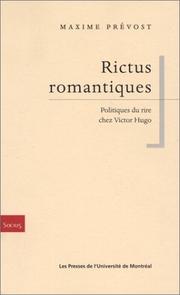
ISBN: 2760618277 9791036503788 2760623696 9782760623699 9782760618275 2760629082 Year: 2002 Volume: 37/2 Publisher: Presses de l’Université de Montréal
Abstract | Keywords | Export | Availability | Bookmark
 Loading...
Loading...Choose an application
- Reference Manager
- EndNote
- RefWorks (Direct export to RefWorks)
Les efforts de l'homme pour se procurer de la joie sont parfois dignes de l'attention du philosophe, écrit Victor Hugo dans L'Homme qui rit. Comme les autres romantiques, il fait pourtant peser un énorme soupçon sur le rire et sur la gaieté. Les rictus omniprésents sous sa plume et celle de ses contemporains appartiennent tant au sadisme qu'à la souffrance, tant au bourreau qu'à sa victime. Alors que notre époque se montre friande de bonne humeur, de fêtes, de festivals, Victor Hugo et ses contemporains des quatre coins de l'Europe jugent que la joie est mal à-propos, elle qui résonne au milieu des souffrances populaires. Il peut lui arriver de sourire ou de verser des larmes, mais le héros hugolien ne rit pas, sauf si on l'y oblige. Doit-on encore lire les romantiques aujourd'hui ? Oui, parce qu'ils nous rappellent qu'il faut résister à la dictature contemporaine de l'allégresse, du rire de force. Voilà pourquoi Rictus romantiques se termine par un « Éloge de la mauvaise humeur ».
Cheerfulness in literature --- Droefheid in de literatuur --- Gaieté dans la littérature --- Lach in de literatuur --- Laughter in literature --- Perversion sexuelle dans la litterature --- Rire dans la littérature --- Sadness in literature --- Seksuele afwijkingen in de literatuur --- Sexual deviation in literature --- Tristesse dans la littérature --- Vrolijkheid in de literatuur --- Hugo, Victor, --- Criticism and interpretation --- Rire dans la littérature. --- Perversion dans la littérature. --- Gaieté dans la littérature. --- Tristesse dans la littérature. --- Laughter in literature. --- Sexual deviation in literature. --- Cheerfulness in literature. --- Sadness in literature. --- Critique et interprétation. --- Criticism and interpretation. --- Sexual perversion in literature --- Hugo, Victor --- Hugo, Victor-Marie --- Hjuho, Viktor --- African literature (French) --- History and criticism. --- Hiwkō, Vikʻtʻor, --- Hījū, Fīktūr, --- Gi︠u︡go, Viktor, --- Hsiao-o, --- Hyowgo, Viktor, --- Hugo, Victor Marie, --- Yü-kuo, Wei-kʻo-to, --- Yü-kuo, --- Hūkū, Fīktūr, --- Ounkō, Viktor, --- Hi︠u︡ho, Viktor, --- Hi︠u︡ho, V. --- Hugo, Viktor, --- Huygo, Victo, --- Gi︠u︡go, V. --- Hyugo, Vhikṭara, --- Igo, Viktor, --- I︠U︡go, Viktor, --- Hyūkō, Vikṭar, --- Hīyūkō, Vikṭar, --- Hiwgō, Viktor, --- Гюго, Виктор, --- הוגאָ, װ. --- הוגא, וויקטאר --- הוגא, וויקטאר, --- הוגא, ויקטור, --- הוגא, װיקטאר --- הוגא, װיקטאר, --- הוגו ויקטור, --- הוגו, ויקטור --- הוגו, ויקטור, --- هوجو، فيكتور، --- 雨果, --- Higu, Fikṭuṛ, --- African literature (French) - History and criticism. --- Hugo, Victor, - 1802-1885 - Criticism and interpretation --- perversion --- littérature --- tristesse --- rire --- Hugo, Victor, - 1802-1885
| Listing 1 - 8 of 8 |
Sort by
|

 Search
Search Feedback
Feedback About UniCat
About UniCat  Help
Help News
News